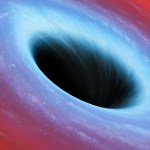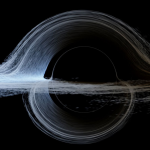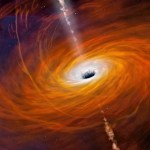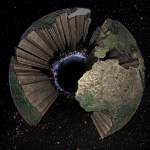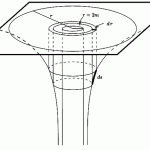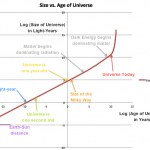Black Holes
“Nothing is lost… Everything is transformed.” -Michael Ende
If you take all the kinetic motion out of a system, and have all the particles that make it up perfectly at rest, somehow even overcoming intrinsic quantum effects, you'd reach absolute zero, the theoretically lowest temperature of all. But what about the other direction? Is there a limit to how hot something can theoretically get?
Image credit: A.Greg; Wikimedia Commons user Greg L.
You might think not, that while things like molecules, atoms, protons and even matter will break down at high enough temperatures, you…
They say ‘A flat ocean is an ocean of trouble. And an ocean of waves… can also be trouble.’ So, it’s like, that balance. You know, it’s that great Oriental way of thinking, you know, they think they’ve tricked you, and then, they have.” -Nigel Tufnel
When you travel towards an object like a moon, planet or star, the closer you get, the larger it appears. Halve the distance and its angular size doubles; reduce the distance to a quarter and it appears four times as large. But for black holes, their gravitation is so strong that relation no longer holds as you approach the event horizon.…
Does a black hole have a shape? Is there a front and back or side view? Does it look the same from all vantage points?
When you think about a black hole, you very likely think about a large amount of mass, pulled towards a central location by the tremendous force of gravity. It's not all that different from our own Sun, which is the largest mass in town. Some 300,000 times as massive as Earth, despite its rotation, the Sun is almost perfectly spherical, differing by less than 0.0001%.
Image credit: Gary Palmer, July 2005, using a violet calcium-K filter.
While black holes themselves may be…
“And no one showed us to the land
And no one knows the where’s or why’s
But something stirs and something tries
And starts to climb towards the light” -Pink Floyd, Echoes
It's pretty difficult to imagine, but a little over 300 years ago, a supernova -- a dying, ultramassive star -- exploded, giving rise to such a luminous explosion that it might have shone as bright as our entire galaxy.
And nobody on Earth saw it.
Image credit: NASA and The Hubble Heritage Team (STScI/AURA); Acknowledgment: R. Fesen (Dartmouth) and J. Morse (Univ. of Colorado).
Located in the plane of our Milky Way galaxy…
“I just think too many nice things have happened in string theory for it to be all wrong. Humans do not understand it very well, but I just don’t believe there is a big cosmic conspiracy that created this incredible thing that has nothing to do with the real world.” -Ed Witten
So the cat is out of the bag, and has been for a long time: as far as theoretical physics ideas go, I think String Theory is a blind alley, a dead end, an idea for whom the fat lady has sung.
Image credit: Perimeter Institute’s Public Lecture series.
But all it takes is one prediction -- a prediction that's unique…
“It is by going down into the abyss that we recover the treasures of life. Where you stumble, there lies your treasure.” -Joseph Campbell
When we look at the centers of galaxies, it's no surprise that there are large black holes there, millions or even billions of times the mass of the Sun.
Image credit: Chandra X-ray Observatory (blue), Hubble Space Telescope (green), Spitzer Space Telescope (pink), & GALEX (purple).
As we look farther and farther away, and hence farther back in time, we'd expect these masses to be much smaller. But what we find is that we have supermassive black…
Out there in the Universe, black holes are some of the most extreme examples of physics in the Universe. Space is curved tremendously, there's an incredible concentration of energy all in one, singular point, and everything that occurs, in theory, outside of the event horizon can be seen in our Universe.
Image Credits: Birmingham Libraries.
But what if one of those things that it can do is make the quantum vacuum in this incredibly curved space unstable? What if it can allow the vacuum to tunnel from its metastable state into one that's truly stable?
Image Credits: Gary Scott Watson.
In…
“Nobody ever did, or ever will, escape the consequences of his choices.” -Alfred A. Montapert
You might not think of falling into a black hole as a choice, but in the case of this week's Ask Ethan, someone is choosing to explore exactly that!
Image credit: original unknown, retrieved from http://mondolithic.com/.
Imagine, if you will, taking a solid object that's completely outside of an event horizon, of choosing a very massive black hole with minuscule tidal forces at that location in space, and then just barely pushing a tiny piece of that object over to the other side of…
“There is, I believe, in every disposition a tendency to some particular evil, a natural defect, which not even the best education can overcome.”
“And your defect is a propensity to hate everybody.”
“And yours… is wilfully to misunderstand them.” -Jane Austen
Every time we go to higher and higher energies in our particle accelerators, we've got a chance for new discoveries, a new understanding, and if we're lucky, some brand new (and unexpected) physics.
Image credit: CERN.
But -- on the downside -- the crazies all come out of the woodwork, and it's time to take on the most regularly-…
“According to the special theory of relativity nothing can travel faster than light, so that if light cannot escape, nothing else can either. The result would be a black hole: a region of space-time from which it is not possible to escape to infinity.” -Stephen Hawking
The idea of a black hole, of a region of space where there's so much matter-and-energy that not even light can escape from it, has been around for hundreds of years.
Image credit: A BBC documentary, retrieved via http://encyclopedia.com/.
Yet despite this constraint, the fact that any form of energy entering it is forbidden…
“A single day is enough to make us a little larger or, another time, a little smaller.” -Paul Klee
As the time passes for us all, and we age, so too does everything else in the Universe. For an object like a black hole, it has the potential to form, grow or shrink as we move forward.
Image credit: Mark Garlick (University of Warwick).
The question, of course, that we might ask is how, and by how much? Is normal (baryonic) matter the only culprit, or can dark matter make a difference for this as well? And if so, under what circumstances, and can it teach us anything about…
“Es ist immer angenehm, über strenge Lösungen einfacher Form zu verfügen.” (It is always pleasant to have exact solutions in simple form at your disposal.) -Karl Schwarzschild
The Universe is a vast and complex place, full of a diversity of structure from the smallest scales to the largest. And yet, by many accounts, it's a wonder that it came to be this way at all.
Image credit: NASA, retrieved from Pearson Education / Addison Wesley.
If things were just a little bit different at the very beginning, the Universe could have recollapsed in on itself in a mere fraction-of-a-second after the…
“And then you wake up, only to see that the darkness has gone, the light now truly makes you feel vulnerable and you wonder why this darkness did not wish you well and why did it leave you so sudden, without revealing the answers you were looking for.” -Chirag Tulsiani
"You've seen one, you've seen them all," said no skywatcher ever when it comes to these wonders of the night sky. Every star, cluster, galaxy and nebula has its own cosmic story, and Messier Monday provides us with a fabulous opportunity to highlight and explore each one.
Image credit: ©2007–2012 Twin City Amateur Astronomers…
“They had discovered one could grow as hungry for light as for food.” -Stephen King
Black holes are an endlessly fascinating topic to learn and speculate about. We've talked about the largest ones in the Universe, but have you ever wondered about the other side of that coin: what about the smallest?
Illustration credit: NASA/CXC/M.Weiss, via http://chandra.harvard.edu/photo/2012/igr/.
As it turns out, although there's one main major way to create black holes, it isn't the only one. A number of theoretical options ought to make it possible to have a black hole that's even smaller than…
“You cannot, in human experience, rush into the light. You have to go through the twilight into the broadening day before the noon comes and the full sun is upon the landscape.” -Woodrow Wilson
You might think of black holes as cosmic rarities, but the fact of the matter is that pretty much every time we form new stars in large numbers, we're going to wind up forming black holes as well. This is something that, over the nearly 14 billion year history of the Universe, each and every galaxy has had literally thousands (if not millions) of opportunities to do.
Image credit: NRAO / Very…
“What makes us love… is when we learn all these fantastic stories. Feeding the imagination is what makes a subject come alive.” -Daniel Tammet
Is the largest object in our galaxy — our central black hole — poised to devour a massive gas cloud?
Image credit: ESO/MPE/M. Schartmann/L. Calçada.
As far as supermassive black holes go, the one at the center of our galaxy is definitely on the boring end. While many galaxies have black holes with tens or hundreds of millions of times the mass of our Sun, and a few even reach into the billions, ours sits humbly at a mere four million solar…
"The world owes you nothing. It was here first." -Mark Twain
When you think about where all of this came from -- back to the beginning of the Universe -- there's a good chance it makes you a little uncomfortable. For this week's Ask Ethan, our one remaining column here on ScienceBlogs, our reader vvv asks a question that quite possibly many of you have wondered:
Why didn't the universe collapse into a black hole right "at the moment of the big bang?"
And quite honestly, I've wondered a fair bit about this myself. Here's why.
Image credit: Kerry-Ann Lecky Hepburn (Weather and Sky Photography…
Coldness can manifest where you least expect it: on a planet rapidly warmed by the combustion of fossil fuel, or in the heart of a star 250 times as massive as our own. On Greg Laden's Blog, Greg explains that an apparent "recovery" of Arctic sea ice from its historic low in 2012 does not invalidate the long-term trend. Greg also explains this year's legacy of extreme weather, such as snow in Cairo, writing that when there is less difference in temperature between equatorial and polar regions, "the jet streams get all wiggly and cause northerly air to reach far to the south in some places and…
"It is by going down into the abyss that we recover the treasures of life. Where you stumble, there lies your treasure." -Joseph Campbell
Ever since we created a question/suggestion box here, we've been deluged by far more excellent questions than one person could possibly answer, but that doesn't mean we aren't trying! For this week's Ask Ethan, our question comes from long-time fan and reader crd2, who asks:
As we look at the furthest quasars we see they have supermassive black holes, as large as 109 solar masses. By what mechanism are they able to reach such large sizes over so short…
"The proverb warns that 'You should not bite the hand that feeds you.' But maybe you should, if it prevents you from feeding yourself." -Thomas Szasz
But on this Messier Monday, you're lucky enough that you're about to be introduced to one of the great northern galaxies of the Messier catalogue that is feeding itself! There are 110 deep-sky, non-transient objects that make up the Messier catalogue, and a full 40 of them are galaxies, the most numerous and most distant of all the types of objects catalogued by Messier.
Image credit: Tenho Tuomi of http://www.lex.sk.ca/astro/messier/…

